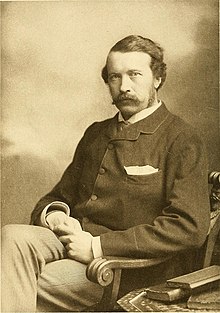George Romanes
George John Romanes (born May 19, 1848 in Kingston , Ontario , Canada ; † May 23, 1894 ) was a British evolutionary biologist . He laid the foundation for animal psychology and predicted similarities between the cognitive processes in humans and animals, but also attributed human properties to animals to a far greater extent than was scientifically proven ( anthropomorphism ).
He was the youngest of Charles Darwin's academic friends. His view of evolution has historical significance. Romanes introduced the term neo-Darwinism , which is still used today to denote a newer form of Darwinism . His untimely death was a loss to British evolutionary biology. Within six years, Mendelian works were rediscovered and new views were put up for debate.
Life
Romanes was born the third son of a Scottish Presbyterian pastor. When he was two years old, his family returned to England, where he spent the rest of his life. Like many English naturalists, he was about to study theology but then decided to study medicine and physiology at Cambridge University . Although he came from an educated family, his school education was changeable. He entered the university with only moderate previous knowledge . In 1871 he finished his Bachelor of Arts degree at Gonville and Caius College , where he is remembered today with a stained glass window in the chapel.
It was in Cambridge that Charles Darwin became aware of Romanes. "How happy I am that you are so young," Darwin said at the time. They remained friends until his death. Led by Michael Forster, Romanes continued his work on invertebrates at University College London . For his work on the nervous system of the Medusa he was awarded membership of the Royal Society in London. Romanes opened the series of annual public lectures at the Sheldonian Theater in Oxford , which have since been called "Romanes Lecture" in his honor.
As a young man, Romanes was still a devout Christian, but in a manuscript that remained unfinished until the end of his life, he stated that the theory of evolution and the influence of his friend Darwin had led him to abandon religion. However, he found his way back from the atheistic denial of all belief in God to resolutely advocating the good right of belief.
Romanes' work on evolution
Romanes often took up the subject of evolution. While he supported Darwin's views and the function of natural selection , he identified three problems in Darwin's teaching:
- The difference between natural species and domesticated variants in terms of fertility.
- Structures that distinguish related species without any expedient evidential value.
- The displacing influence that acts on the species that emerged from an initial species.
Romanes also indicated that Darwin ultimately failed to explain how new species arise, despite the title The Origin of Species . Obviously, natural selection could lead to adaptation , but how did new species actually emerge?
Romane's own solution to this was physiological selection . His idea was that the difference in ability to procreate, mainly this creates that homozygosity to avoid the parents. That is the decisive force that causes the emergence of new species. The majority view then and now was that geographical isolation is the force that creates new species, since gene flow can no longer take place between spatially separated species.
Works (selection)
- The scientific evidences of organic evolution . 1877
- Candid examination of theism . 1878 (published as Physicus)
- Animal Intelligence . 1881
- Mental evolution in animals, with a posthumous essay on instinct by Charles Darwin . 1883
- Jelly-fish, star-fish and sea urchins, being a research on primitive nervous systems . 1885
- Physiological selection: an additional suggestion on the Origin of Species . 1886
- The spiritual development in the animal kingdom. Darwinist Writings, Second Series, Volume V, Ernst Günther, Leipzig 1887 ( Archive )
- Mental evolution in man . 1888
- Aristotle as a naturalist . 1891
-
Darwin, and after Darwin . 3 volumes, 1892–1897
- Volume I The Darwinian theory . 1892
- Volume II Post-Darwinian questions: heredity and utility . 1895
- Volume III Post-Darwinian questions: Isolation and physiological selection . 1897
- An examination of Weismannism . 1893
- Essays . 1897
- Thoughts on Religion . 1904 (posthumous)
Individual evidence
- ^ Rainer Wiedenmann: Animals, morality and society: elements and levels of humanimal sociality. Springer-Verlag, 2009, ISBN 978-3-53191-650-7 , p. 126
- ^ Romanes, Ethel 1896. Life and letters of George John Romanes . Longmans, Green, London. p3
- ^ 'Physicus' [Romanes GJ] 1878. A candid examination of theism . Kegan Paul, Trench, Trubner, London.
- ^ Romanes GJ 1895. Thoughts on religion . ed Charles Gore. Open Court, Chicago. p169
- ↑ Zöckler, God's witnesses in the realm of nature, 1906, p. 461
| personal data | |
|---|---|
| SURNAME | Romanes, George |
| ALTERNATIVE NAMES | Romanes, George John (full name) |
| BRIEF DESCRIPTION | British evolutionary biologist |
| DATE OF BIRTH | May 19, 1848 |
| PLACE OF BIRTH | Kingston , Ontario , Canada |
| DATE OF DEATH | May 23, 1894 |
